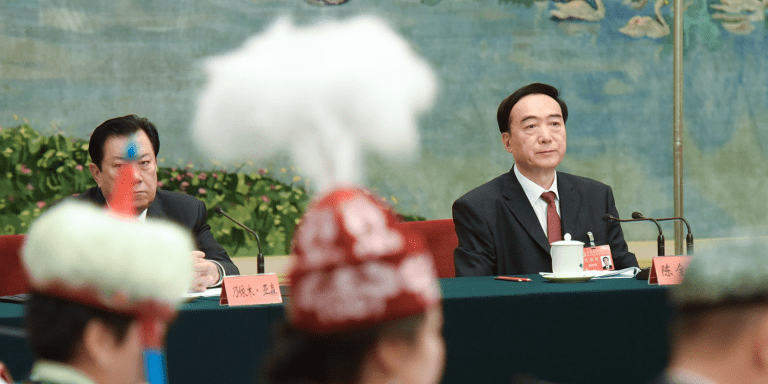
ARCHIVED Ban Chen Quanguo
The architect of Tibetan and Uyghur repression must be banned from the UK…

In August 2016, Chen Quanguo was placed in charge of the Uyghur region, known as Xinjiang to much of the world, but as East Turkestan to the native Uyghur population. The Uyghurs are an ethnically and culturally Turkic group of people whose main religion is Islam.
Chen’s appointment was a reward for his work in Tibet, where senior CCP members claimed he brought “ethnic stability”. Measures Chen imposed in Tibet, including heavy security and cutting edge surveillance technologies, would be rolled out on an even larger scale in the Uyghur region. The “grid management” program first implemented in Tibet was expanded, using facial recognition and QR codes in homes to get personal details about the residents.
The Uyghur people had already experienced decades of repressive rule under the Chinese government, but Chen intensified the persecution. Following his appointment, Human Rights Watch noted that large-scale abuses against Uyghurs increased to “a scope and scale not seen in China since the 1966-1976 Cultural Revolution”.
In April and May 2017, Uyghurs living in the west began to express fears that they could no longer contact family members and friends still living in the Uyghur region. That same year, reports emerged that Uyghurs and Kazakhs were being forcibly incarcerated in camps, where detainees would be forced to undergo political re-education for periods as long as a year. An estimated one million Uyghurs and Kazakhs have been arbitrarily detained in these camps. The mass detentions have been accompanied by accounts of torture, political indoctrination and disappearances.
Camp survivors have described, in testimonies, how the primary motivation of the camps was political indoctrination. These included accounts of being forced to sing patriotic Chinese songs and swear loyalty to Xi Jinping.
Meanwhile, sources have also recently reported on a pipeline between the camps and factories across China that could amount to forced labour. In March 2020, the Australian Strategic Policy Institute (ASPI) published a report estimating that at least 80,000 Uyghurs had been coercively assigned to factories producing goods for up to 83 foreign and Chinese companies.
As with Tibet, Chen’s repressive security policies have been accompanied with attempts to dilute the cultural and religious identity of the Uyghur region, under the pretext of trying to ‘de-extremify’ the region. In practice, this has meant targeting those peacefully practicing Islam as ‘extremists’ and ‘terrorists’.
Even prior to the camps, the CCP targeted the religion and language of the Uyghur population. All mosques and imams are heavily monitored by the Chinese government and must be government-approved. Even owning a Quran or prayer mat, growing a long beard or wearing an Islamic veil are banned. Communicating religious messages online is also strictly forbidden. Further, similar to how Han Chinese replaced the Tibetan language in Tibetan schools, the Uyghur language has been banned or discouraged in schools and public offices in East Turkestan. Teaching children under 18 about religion has been banned, as well as giving them traditional Islamic names
Most disturbingly of all, a recent investigation by the Associated Press has unearthed evidence of forced sterilisations and abortions carried out on hundreds of thousands of Uyghur women in an effort to curb the population of Uyghurs. Several Uyghur women have stepped forward to back up these claims.
We must not allow Chen Quanguo to continue his repressive and inhumane rule. Sign the petition and demand that the Government bans Chen from entering the UK.
Sign the petition

The architect of Tibetan and Uyghur repression must be banned from the UK…
In 2011, Chen Quanguo was appointed to the position of Party Secretary of the Tibet Autonomous Region. He wasted no time in cracking down on Tibet…
Since we kicked off the campaign in November 2020, it has gone from strength to strength, as you can see in our timeline.
